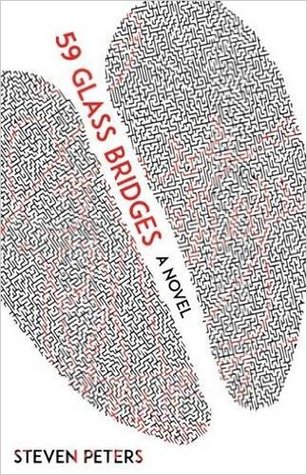
Review by Deborah Vail
Steven Peters makes an impressive entrance into the world of speculative fiction with his debut novel, 59 Glass Bridges, which began as his thesis project while studying English at the University of Calgary. Inspired in part by Lewis Carroll’s Alice’s Adventures in Wonderland, Dante Alighieri’s Divine Comedy, the fifty-nine bridges in Peters’ hometown of Calgary, and his memories, this story is dark, evocative, and compelling.
Peters transports his readers into the tormented mind of his unnamed protagonist who is trapped within a hellish world where walls collapse, snowmen speak, an owl quips, “Man is the real monster,” and where he befriends a ghost named Willow. Twined with this horrifying trek through the labyrinth of the protagonist’s mind is the vivid recollections of his grandmother.
When the protagonist was eight-years-old, his grandmother took him to a corn maze and sent him in alone. In the maze, he was chased by a creature with hooves, its breath hot on his neck, its fingers brushing the back of his clothes. After he emerged terrified, the grandmother said, “I forgot to tell you that there is one real monster in any maze. Only one creature can find its way around. I forgot to warn you about the Minotaur.” This sets the stage as the dual narratives unfold.
Willow coaxes the narrator along this harrowing journey and often reinforces teachings he received from his grandmother when he was young. In one instance, Willow says, “if you spend all your time wondering where you are, how do you expect to get where you want to be?” While his grandmother once echoed a similar statement that “a life without direction is meaningless.”
There are few clues throughout the story that hints to the narrator’s identity. He’s been stripped of his regular attire that he describes as a “carefully crafted façade—skinny fit denim, chambray in various fall hues, and a haircut that suggests I’m trying but not too hard.” In the pocket of his shabby windbreaker, he discovers a “Gideon New Testament replete with Psalms and Proverbs,” similar to the one he owned as a child. Scribbled in the margins are messages written in Italian, but he can only decipher one word: “abandon.” Still, his true identity remains elusive.
This lost character is truly loveable in his stubbornness to figure out what he must do to be free, and readers will identify with his sorrow, confusion, loneliness, and especially, his regrets. And as dark as this story is at times, it’s peppered with genuine wit. As the narrator navigates a particularly nasty wasteland where dead body parts jut from thick ice, he says, “I move forward, steadying myself with this helping hand, that leg up.”
Peters’ writing truly shines as the setting switches from the narrator’s deep mind-maze of thoughts to the tender memories of times spent gardening and creating art with his grandmother. He balances both threads of this narrative skillfully, as one story strengthens the other and the emotions embedded within the novel take shape. His writing is clever; the language he uses is accessible and elicits contemplation.
Peters cuts to the core of humanity in his unwavering ability to show readers the complicated truth of what love and loss between two people really looks like, as the narrator reflects on his grandmother once more:
“I sat beside her while she slept and cradled her head and wondered about how I might have rewritten my youth, gotten to know her better, given half a chance. Only after she fell asleep did I let myself cry over the chunks of missing hair and her yellowed skin.”
59 Glass Bridges is, by far, one of the most memorable reads I’ve enjoyed in a long time. It demands the reader to slow down, pay attention to clues, and reflect on the deeply personal questions that plague us. This story doesn’t follow a typical plot with mounting tension and an anticipated conclusion, and I suspect that interpretations of this story will vary. Like the lingering emotions after waking from a bizarre dream, it takes time to make sense of it. For me, it reinforced the notion that hope is sometimes all we’ve got.
Deborah Vail is currently a candidate for an MFA in creative writing from the University of British Columbia. She writes short fiction, CNF, and has recently completed her first novel.